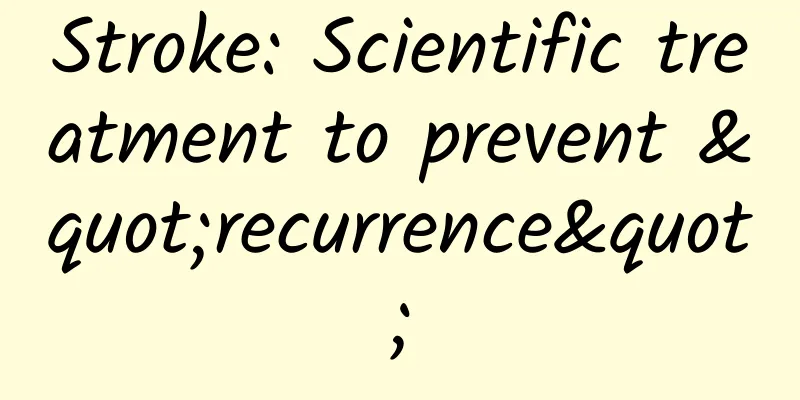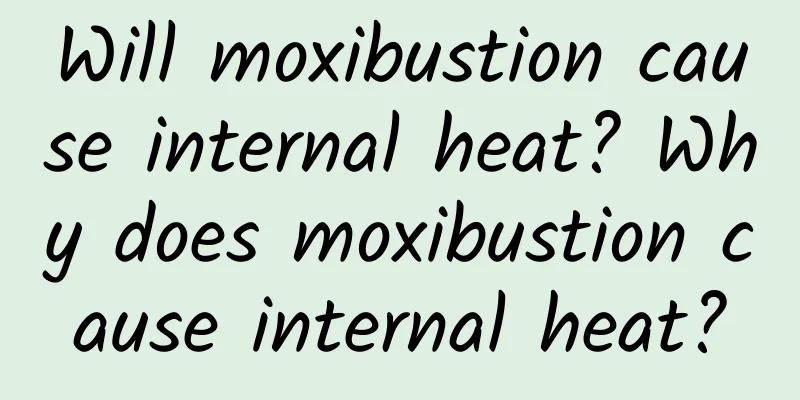Stroke: Scientific treatment to prevent "recurrence"

|
Author: Yang Qiong, deputy chief physician, Peking University Third Hospital Liu Xiaolu, deputy chief physician, Peking University Third Hospital Reviewer: Fan Dongsheng, Chief Physician, Peking University Third Hospital Stroke can cause permanent neurological damage. If it is not diagnosed and treated promptly during the acute phase, the patient may develop serious complications or even die. Stroke is prone to relapse after treatment. Effective prevention of relapse can improve the patient's prognosis. Let's learn about the precise treatment and relapse prevention strategies for stroke. Figure 1 Copyright image, no permission to reprint 1. How to treat stroke? Stroke can be treated in different ways according to the different sites of onset, mainly including drug therapy and surgical treatment. Specific treatments for stroke include thrombolysis, anticoagulation, antiplatelet aggregation and neuroprotective treatment; non-specific treatments include lowering blood pressure, controlling blood sugar, and treating cerebral edema and intracranial hypertension. (1) Drug treatment Figure 2 Copyright image, no permission to reprint Thrombolysis is currently recognized as the most effective treatment for stroke, but there are strict time window requirements, that is, intravenous thrombolysis is limited to 4.5 hours after onset, and arterial thrombolysis time can be appropriately extended. For patients with stroke and hypertension, blood pressure control should follow the relevant guidelines for stroke during the acute phase of stroke; for patients with chronic or old stroke, the blood pressure control target is generally <140/90 mmHg; for patients with dyslipidemia and diabetes, the blood pressure control target is generally <130/80 mmHg. The principle of antihypertensive treatment for stroke patients is stable and lasting, and effectively control 24-hour blood pressure, especially morning blood pressure. During antihypertensive treatment, drugs should start with a small dose, and the blood pressure should not be lowered too quickly to prevent insufficient blood supply to the brain. Within 24 hours of the onset of ischemic stroke, patients' blood pressure should be controlled with caution. Figure 3 Copyright image, no permission to reprint (2) Surgical treatment 1) Carotid endarterectomy: It is suitable for patients with severe stenosis of the extracranial segment of the internal carotid artery (stenosis degree exceeds 70%), stenosis below the mandibular angle and surgical accessibility. If the internal carotid artery is completely occluded within 24 hours, surgical treatment can be considered after appropriate evaluation; however, if the occlusion time exceeds 24 hours and encephalomalacia has occurred, surgical treatment is not suitable. Figure 4 Copyright image, no permission to reprint 2) Extracranial-intracranial artery anastomosis: This procedure is effective in preventing transient ischemic attacks. The options include superficial temporal artery-middle cerebral artery anastomosis, occipital artery-posterior inferior cerebellar artery anastomosis, and occipital artery-posterior cerebral artery anastomosis. 2. My body has fully recovered after a stroke. Do I still need to continue taking medication? One week ago, Lao Wang suddenly couldn't hold the chopsticks with his right hand while eating breakfast. He staggered and almost fell on his way to the bedroom. His family quickly sent him to the hospital. Figure 5 Copyright image, no permission to reprint The doctor diagnosed Lao Wang with cerebral infarction. After one week of treatment, Lao Wang's body basically recovered and he could be discharged from the hospital. Before leaving, the doctor prescribed several oral medications for Lao Wang and told him to take the medications on time and to go to the outpatient clinic for regular checkups. Lao Wang had a question in his mind: I have recovered, why do I need to take medication after being discharged from the hospital? Figure 6 Copyrighted images are not authorized for reproduction In fact, the use of drugs for cerebral infarction has different meanings at different stages. Acute treatment may include thrombolytic drugs, oral drugs, Chinese patent medicines, etc. The main purpose is to dissolve blood clots, reduce cerebral edema and prevent complications. The occurrence of cerebral infarction is often caused by atherosclerosis or stenosis of blood vessels supplying brain tissue, easily detached emboli in the heart or other causes, so long-term oral medication is usually required to control these causes and avoid recurrence of cerebral infarction. These drugs include aspirin, clopidogrel, warfarin, rivaroxaban and dabigatran, which have antithrombotic effects, statins that lower blood lipids and stabilize atherosclerotic plaques, as well as antihypertensive and hypoglycemic drugs. Figure 7 Copyright image is not authorized for reproduction The treatment of cerebral infarction is by no means a "one-time deal". It must be treated as a "protracted war" with long-term medication to prevent it from "coming back". |
<<: Why do I have diarrhea when I am nervous? If this happens, it may be due to illness...
Recommend
When will Starbucks' 2019 Christmas limited edition drink start selling? Christmas Snow Tree Matcha Latte launch time
We all know that every Christmas, Starbucks will ...
Pregnant woman's blood test can tell the gender of the baby
During pregnancy, prenatal check-up is an indispe...
What causes pain on the left side of the lower abdomen
This condition of cramping on the left side of th...
Why does pregnant women have a lot of leucorrhea with a strange smell?
After the implementation of family planning in ou...
15 days after intercourse, a gestational sac was seen on ultrasound
Having sex 15 days ago is roughly within the 4th ...
How to keep conchs until they are delivered the next day How to keep conchs
Conch is a kind of seafood. Its meat can be eaten...
Is it best not to come into contact with patients who have undergone chemotherapy? Can chemotherapy drugs be transmitted to people around you?
Rumor: "It is best not to contact patients w...
What is breast hyperplasia?
Breast hyperplasia is a very common gynecological...
Malignant uterine tumor pictures
Most of the female friends who suffer from uterin...
Can I take medicine during my period?
Girls often have such a few days every month. If ...
What to eat to make breasts bigger
Breast enhancement and weight loss are really a v...
Why does the mother's knee hurt?
If a mother experiences knee pain in her daily li...
Scar removal medicine, there is a great way to remove scars
Every woman wants to have flawless skin, but acci...
What causes back pain during menstruation?
During menstruation, many people will experience ...
Is it good for pregnant women to take a bath every day?
After pregnancy, many women will stay at home to ...









